- Home
- C. Sean McGee
The Time Traveler's Wife Page 5
The Time Traveler's Wife Read online
Page 5
mankind, with his creation, with free will? Has God hanged himself, somewhere where no-one bothered to look, in the dark side of heaven?”
“Yes,” The Man said, bored.
“Who are you?”
“Who are you?” The Man responded.
“I asked first.”
“I am the footprint of my past,” The Man said. “I am like the displacement of water, proof enough that from my past, I exist in the present and, therefore, can be gambled upon someplace in the future. I am a collection of my memories. Without them, I am someone else.”
“I’m John,” said John.
“I know.”
“How?”
“It says so. ON your breast.”
John looked down at the silver name badge hanging from his left breast pocket in plain and simple view. He wondered then, for a second, if there were two lines, or a hundred and fifty characters, written on his back that best synopsized who he was and hinted toward who or what he might become.
“Do you believe in time travel?” John asked.
“I do not see time as linear, with a zero on one side and a one on the other.”
“Then what is time?”
“Something we outgrow. Something to wish and then reflect upon”
“I want to live in the present. To exist. To be. Right now. Always now.”
“You cannot live in the present for you are versed only in the past.”
“That’s not true. Right now we are debating.”
“And you are referring to something that I have already said. The moment I open my mouth and the moment I speak, as you follow my words and interpret them in your mind, you are caught on the coat tail of time, and so you are caught in the past.”
“Right now,” John said, “I am scratching. I’m not responding to you. I am scratching my arm. I can feel it. It is in the present.”
“There is a lag between your conscious and subconscious. You are not existence. You are the expression of existence. You are the wake that trails behind the vessel of the dead. You are the expansive and fraught echo of media that terrorizes after the blood and dust have settled. Everything you think will be in reference to what has already been or in theory, what one day will come to be. But in the future, when it is perceived as being the present, you will only know it has come into being by examining it in the past.”
“I’ve been thinking about the past a lot, like all the chances I had and if I could what I would do differently. If I could…”
“There is an equation for that dilemma. Hindsight equals foresight minus insight. You need to think about tomorrow. That’s it. Nothing else. Think about tomorrow and the day after that.”
“What about today?”
“You would have thought about that yesterday. It’s already covered.”
The bus stopped and The Man got up and squeezed past John, throwing the book towards him and smiling as he alighted through the central door. “But I might be wrong,” he said.
As the bus started to pull away, John took The Man’s book in his hands, flicking through the pages so that the words swam over one another like shadowy waves and he hovered over the pages, as he had when he was a boy, above the edge of a swimming pool, wanting to dive in but scared to death and unsure where to begin. He didn’t even see The Man waving, before turning and walking in both directions, up and down the street.
He put the book down and stared out the window and he saw, on the sidewalk, a big red balloon that had appeared out of nowhere and was blowing down the street, in the direction of a small girl that was holding her grandfather’s hand, waiting in line to buy some colored string. The big red balloon bounced down the sidewalk and stopped at the little girl’s feet. John tried to look behind, but he couldn’t see where the balloon had come from. He wondered if it had been part of a celebration; a christening, a birthday party, a retirement or maybe a funeral.
The little girl, still holding her grandfather’s hand, leaned down and picked up the balloon and then wobbled it around the air. Holding onto the colored streamer that was tied to its end, she waved the balloon back and forth and giggled manically as it flew up in the air and then pulled back towards her, bouncing back off her hand each time.
If that balloon were a book, John would want to know what it was doing there on the street, where it had come from and who blew it up in the first place. He wouldn’t play with it until he knew these things. And a strange astonishment washed over him as he watched the little girl playing with the red balloon, holding her grandfather’s hand and waiting in line to buy some colored string. Though there was no reason for the balloon being there though its presence was without explanation, it seemed that little girl did not care, she still found fancy in its game. And the game didn’t need to be defined to be fun. It didn’t need to have meaning to have a purpose.
Everything in John’s life was to be expected.
Everything was planned.
Nothing ever came out of nowhere.
A Brief Introduction to Active Noise Reduction
Tracy was already waiting at the stop in front their house. She’d asked John if he’d remembered to pick up something to eat on the way back from work and he told her he’d forgotten. She said it didn’t matter, but her words did little to hold back the gale of unease that rocked John’s already shaky foundation. When she asked him why he didn’t drive, he lied and made up some excuse about the car’s distributor and when she asked him what bus he was on, he lied again.
When the bus got close to his house, John didn’t press the bell. He thought about it. He even twitched his finger as if he were anxiously waiting for the right time. But the bus drove right past his house and right past his wife.
It continued in a direction which he hadn’t traveled in many years, into a part of town that he hadn’t seen since he was a boy. And as he stared out the window, seeing the lines of sycamore trees whose thick straggling roots, broke apart the footpath as if it were a poorly sewn seam, John’s mind started to recall memories that like this part of town, he had long since forgotten.
He remembered how when he was seven, he and his friends had thought that these trees were gargantuan and wanted to climb them, and to take nest up high on the thick overhanging branches, kicking your feet and spitting on the roves of the cars that passed below, that was the greatest feat imaginable.
And though he never thought he could, he did, one day when he was all alone, climb to the highest branch that reached out over the cobble stoned street and he sat nervously on the limb, hidden beneath a canopy of green leaves, watching the cars and the people pass by underneath.
And though he knew his friends would never believe him, he told them anyway. He told them about how tiny everything seemed and about how the wind almost blew him off his perch. And he told them about a nest he saw that was literally just within his grasp and in it, the three little baby birds that were chirping and waiting for their mum to come back with food.
And when nobody believed him, he showed them a single leaf that he had picked from the highest branch to prove it but his friends all scoffed and said he was just making everything up that no-one could every get to the top, especially not him, and that it was just a stupid leaf.
The only other time he had called this memory before today was when he first garnered the courage to talk to Tracy. He had wanted to for years, but he had neither the gall nor the confidence to approach her. To speak to her and to make her care what he had to say, for John, when he was a young man, was the greatest feat imaginable.
Tracy had been sitting under the very tree he climbed when he was seven. Now, fourteen years later, he returned to that very spot and took a deep anchoring breath, as he had when he was a boy, and approached Tracy and he told her the story of when he was brave and how he climbed to the highest branch and spent the whole day, high above the earth, hidden inside a canopy of green leaves, watching over a nest of baby birds.
He spoke to her as if they had known each other their whole lives
and she listened with such delicate address as if they had. He spoke about how scared he had been to leave the ground and how around his friends, he had less courage than when he was on his own but how he thought that his courage was dependent on this exact tree and none other. And Tracy listened to him telling his story and she heard and felt, in the spaces between his words, the very courage that he spoke of.
And before he left, he showed her the leaf that he had kept with him since he was a boy. And as they aged and their love grew, she kept that very leaf in a locket that she wore around her neck.
Now, staring out of the window, the trees didn’t seem so gargantuan. They just looked like trees and the giant crevices in the earth where the thirsted veins of this great tree scourged through, they were less impressive than he had imagined and remembered. They looked like more of a nuisance than anything.
And though he tried to see them in the same light, he couldn’t.
And as he stared at the trees, which in his sight and now in his thoughts, seemed marginal and hardly a laudable feat, he grew a disliking for the very memory that had for years, for as long as he had stayed away from this street, seemed so full of life and color and immense dimension and inspiration. A memory that now, as a grown man with a cynical and hollow imagination, seemed minute and trivial.
He felt tightness in his chest and a small ache in his mind. It felt as if someone was stabbing a tiny pin through his skull and his
“Yes,” The Man said, bored.
“Who are you?”
“Who are you?” The Man responded.
“I asked first.”
“I am the footprint of my past,” The Man said. “I am like the displacement of water, proof enough that from my past, I exist in the present and, therefore, can be gambled upon someplace in the future. I am a collection of my memories. Without them, I am someone else.”
“I’m John,” said John.
“I know.”
“How?”
“It says so. ON your breast.”
John looked down at the silver name badge hanging from his left breast pocket in plain and simple view. He wondered then, for a second, if there were two lines, or a hundred and fifty characters, written on his back that best synopsized who he was and hinted toward who or what he might become.
“Do you believe in time travel?” John asked.
“I do not see time as linear, with a zero on one side and a one on the other.”
“Then what is time?”
“Something we outgrow. Something to wish and then reflect upon”
“I want to live in the present. To exist. To be. Right now. Always now.”
“You cannot live in the present for you are versed only in the past.”
“That’s not true. Right now we are debating.”
“And you are referring to something that I have already said. The moment I open my mouth and the moment I speak, as you follow my words and interpret them in your mind, you are caught on the coat tail of time, and so you are caught in the past.”
“Right now,” John said, “I am scratching. I’m not responding to you. I am scratching my arm. I can feel it. It is in the present.”
“There is a lag between your conscious and subconscious. You are not existence. You are the expression of existence. You are the wake that trails behind the vessel of the dead. You are the expansive and fraught echo of media that terrorizes after the blood and dust have settled. Everything you think will be in reference to what has already been or in theory, what one day will come to be. But in the future, when it is perceived as being the present, you will only know it has come into being by examining it in the past.”
“I’ve been thinking about the past a lot, like all the chances I had and if I could what I would do differently. If I could…”
“There is an equation for that dilemma. Hindsight equals foresight minus insight. You need to think about tomorrow. That’s it. Nothing else. Think about tomorrow and the day after that.”
“What about today?”
“You would have thought about that yesterday. It’s already covered.”
The bus stopped and The Man got up and squeezed past John, throwing the book towards him and smiling as he alighted through the central door. “But I might be wrong,” he said.
As the bus started to pull away, John took The Man’s book in his hands, flicking through the pages so that the words swam over one another like shadowy waves and he hovered over the pages, as he had when he was a boy, above the edge of a swimming pool, wanting to dive in but scared to death and unsure where to begin. He didn’t even see The Man waving, before turning and walking in both directions, up and down the street.
He put the book down and stared out the window and he saw, on the sidewalk, a big red balloon that had appeared out of nowhere and was blowing down the street, in the direction of a small girl that was holding her grandfather’s hand, waiting in line to buy some colored string. The big red balloon bounced down the sidewalk and stopped at the little girl’s feet. John tried to look behind, but he couldn’t see where the balloon had come from. He wondered if it had been part of a celebration; a christening, a birthday party, a retirement or maybe a funeral.
The little girl, still holding her grandfather’s hand, leaned down and picked up the balloon and then wobbled it around the air. Holding onto the colored streamer that was tied to its end, she waved the balloon back and forth and giggled manically as it flew up in the air and then pulled back towards her, bouncing back off her hand each time.
If that balloon were a book, John would want to know what it was doing there on the street, where it had come from and who blew it up in the first place. He wouldn’t play with it until he knew these things. And a strange astonishment washed over him as he watched the little girl playing with the red balloon, holding her grandfather’s hand and waiting in line to buy some colored string. Though there was no reason for the balloon being there though its presence was without explanation, it seemed that little girl did not care, she still found fancy in its game. And the game didn’t need to be defined to be fun. It didn’t need to have meaning to have a purpose.
Everything in John’s life was to be expected.
Everything was planned.
Nothing ever came out of nowhere.
A Brief Introduction to Active Noise Reduction
Tracy was already waiting at the stop in front their house. She’d asked John if he’d remembered to pick up something to eat on the way back from work and he told her he’d forgotten. She said it didn’t matter, but her words did little to hold back the gale of unease that rocked John’s already shaky foundation. When she asked him why he didn’t drive, he lied and made up some excuse about the car’s distributor and when she asked him what bus he was on, he lied again.
When the bus got close to his house, John didn’t press the bell. He thought about it. He even twitched his finger as if he were anxiously waiting for the right time. But the bus drove right past his house and right past his wife.
It continued in a direction which he hadn’t traveled in many years, into a part of town that he hadn’t seen since he was a boy. And as he stared out the window, seeing the lines of sycamore trees whose thick straggling roots, broke apart the footpath as if it were a poorly sewn seam, John’s mind started to recall memories that like this part of town, he had long since forgotten.
He remembered how when he was seven, he and his friends had thought that these trees were gargantuan and wanted to climb them, and to take nest up high on the thick overhanging branches, kicking your feet and spitting on the roves of the cars that passed below, that was the greatest feat imaginable.
And though he never thought he could, he did, one day when he was all alone, climb to the highest branch that reached out over the cobble stoned street and he sat nervously on the limb, hidden beneath a canopy of green leaves, watching the cars and the people pass by underneath.
And though he knew his friends would never believe him, he told them anyway. He told them about how tiny everything seemed and about how the wind almost blew him off his perch. And he told them about a nest he saw that was literally just within his grasp and in it, the three little baby birds that were chirping and waiting for their mum to come back with food.
And when nobody believed him, he showed them a single leaf that he had picked from the highest branch to prove it but his friends all scoffed and said he was just making everything up that no-one could every get to the top, especially not him, and that it was just a stupid leaf.
The only other time he had called this memory before today was when he first garnered the courage to talk to Tracy. He had wanted to for years, but he had neither the gall nor the confidence to approach her. To speak to her and to make her care what he had to say, for John, when he was a young man, was the greatest feat imaginable.
Tracy had been sitting under the very tree he climbed when he was seven. Now, fourteen years later, he returned to that very spot and took a deep anchoring breath, as he had when he was a boy, and approached Tracy and he told her the story of when he was brave and how he climbed to the highest branch and spent the whole day, high above the earth, hidden inside a canopy of green leaves, watching over a nest of baby birds.
He spoke to her as if they had known each other their whole lives
and she listened with such delicate address as if they had. He spoke about how scared he had been to leave the ground and how around his friends, he had less courage than when he was on his own but how he thought that his courage was dependent on this exact tree and none other. And Tracy listened to him telling his story and she heard and felt, in the spaces between his words, the very courage that he spoke of.
And before he left, he showed her the leaf that he had kept with him since he was a boy. And as they aged and their love grew, she kept that very leaf in a locket that she wore around her neck.
Now, staring out of the window, the trees didn’t seem so gargantuan. They just looked like trees and the giant crevices in the earth where the thirsted veins of this great tree scourged through, they were less impressive than he had imagined and remembered. They looked like more of a nuisance than anything.
And though he tried to see them in the same light, he couldn’t.
And as he stared at the trees, which in his sight and now in his thoughts, seemed marginal and hardly a laudable feat, he grew a disliking for the very memory that had for years, for as long as he had stayed away from this street, seemed so full of life and color and immense dimension and inspiration. A memory that now, as a grown man with a cynical and hollow imagination, seemed minute and trivial.
He felt tightness in his chest and a small ache in his mind. It felt as if someone was stabbing a tiny pin through his skull and his

 Coffee and Sugar
Coffee and Sugar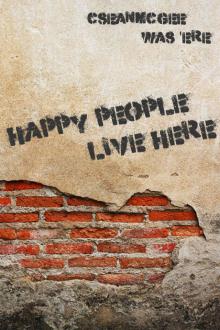 Happy People Live Here
Happy People Live Here_preview.jpg) Alex and The Gruff (A Tale of Horror)
Alex and The Gruff (A Tale of Horror)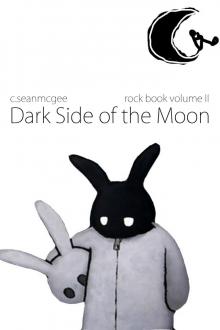 Dark Side of the Moon
Dark Side of the Moon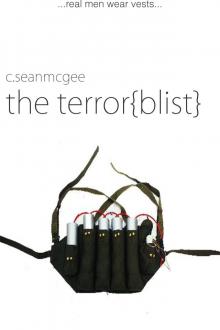 The Terror{blist}
The Terror{blist}_preview.jpg) The Anarchist (...Or About How Everything I Own Is Covered In A Fine Red Dust)
The Anarchist (...Or About How Everything I Own Is Covered In A Fine Red Dust)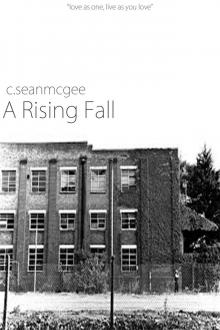 A Rising Fall
A Rising Fall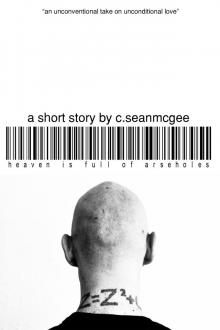 Heaven is Full of Arseholes
Heaven is Full of Arseholes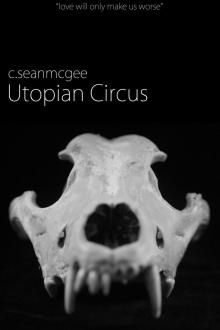 Utopian Circus
Utopian Circus![[2014] The Time Traveler's Wife Read online](http://i1.bookreadfree.com/i/03/24/2014_the_time_travelers_wife_preview.jpg) [2014] The Time Traveler's Wife
[2014] The Time Traveler's Wife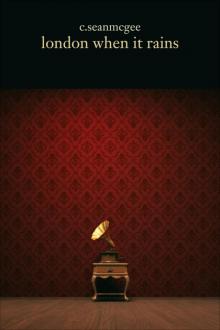 London When it Rains
London When it Rains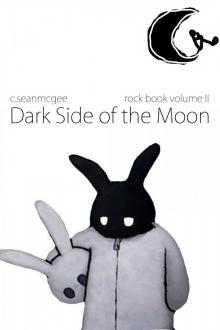 Dark Side of the Moon by C. Sean McGee
Dark Side of the Moon by C. Sean McGee![The Terror[blist] Read online](http://i1.bookreadfree.com/i2/04/06/the_terrorblist_preview.jpg) The Terror[blist]
The Terror[blist]